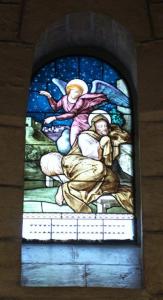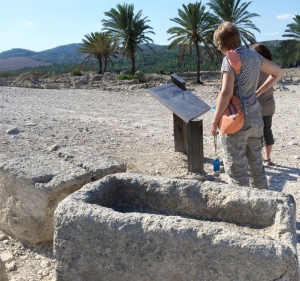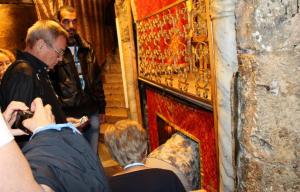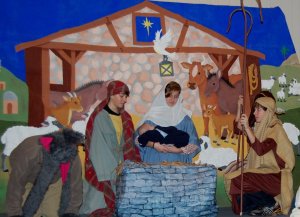Max crouched down, squished himself in between two other six-year olds and waited eagerly, like a compressed spring about to uncoil, for his turn. He looked up at his older cousin, Alexandra, and whispered, “What’s a sin?”
He was a little embarrassed and hoped no one other than Alexandra had heard him. She had seen what was going on between him and the other boy. She would understand that it wasn’t Max’s fault he hadn’t been completely listening to Miss Becca, his vacation Bible school teacher.
He thought it was nice that some of the married teachers, including Miss Becca, didn’t always want to be called Mrs. So-and-So. Miss Becca let you call her by her first name, as long as you added “Miss” beforehand. Max first met Miss Becca in church. She sat next to him a couple times during worship service, and every now and then she taught his Sunday school class. Max liked the way she paid attention to him when he talked with her. She looked him right in the eyes and didn’t seem bothered by any of his questions.
Today, she asked that everyone call her Lady Becca. All the lady teachers, the girls, and she were strolling around like royalty, with their chins up and heads high. When she spoke, she didn’t pronounce words like she normally did. Everything she said seemed more proper and formal, and to top that off, she taught the boys how to bow and the girls how to curtsy.
“Too bad for them,” Max thought. Bowing was so much better. It didn’t require practice like the girls were doing. Boys were way more cool. They could pretend to be brave knights defending a kingdom. He was glad that his mom knew about the medieval theme and let him take a toy sword to the summer program. Swords weren’t normally allowed at church. Max figured this week would be fun.
When Lady Becca had explained what a sin was, Max was distracted by his new friend, Aidan, who kept trying to take Max’s sword away from him. “Just for a minute,” Aidan had pleaded, but Max knew better than to give up his plastic weapon. He might never get it back! It was no wonder he missed some of what his teacher had said. He was lucky just to have caught the most important part: only one person in all of history has never sinned. “But what exactly are my sins?” he silently worried.
Without hesitating, Alexandra simultaneously answered the question he asked out loud and the one he was thinking. She said, “A sin is anything you do that’s wrong.”
“Thanks, Alex,” he softly replied.
Alexandra preferred to be called “Alex.” That’s what her mom called her, what her dad called her, and what Max called her, usually. Alex was pretty smart…and she paid attention. Or, she paid attention…and was pretty smart. One way or another, she seemed to know about God’s son who came down from heaven to be with people. Alex was fourteen and old enough to be Lady Becca’s youth helper. All the teachers had at least one of the older kids to help teach the younger children about the stories in the Bible.
Lady Becca described Jesus as both God and man but a man like no other. She gave examples: He had never lied; never cheated; and never hit his brother, not even once. She said, “Lots of people liked Jesus because he was good at fixing things. Many people hated him because they didn’t know him very well.”
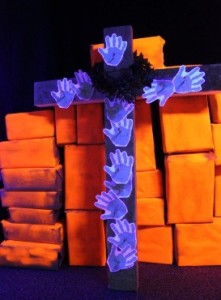
“For even the Son of Man did not come to be served, but to serve, and to give his life as a ransom for many.” Jesus’ words as recorded in Mark 11:45 (NIV). Photo by Kelly Bixby
Alex added, “Other people had no feelings whatsoever about him, because they had never heard of him.”
Max took the piece of paper that Lady Becca held out to him. He noticed that it was shaped like a hand, so he held the paper up and compared it to his own. His palm fit inside the paper’s edges almost perfectly. It was as if Max had spread his fingers wide, plopped them upon a single sheet of paper, pencilled up and down, around and around, and then cut along all the lines to end up with the paper he was now holding. Max followed Lady Becca’s instructions and wrote his name in crayon on the front of it.
Lady Becca’s red velvet gown swept the floor as she continued moving about the room, passing from person to person, with the goal of giving everyone their own hand-shaped sheet of paper. She wore a stretchy silver fabric band around her head. It had one lone ruby-colored jewel in the center and wasn’t meant to look like a more elaborate, richly adorned crown. After all, she wasn’t “Queen Becca.” But she was dressed like someone who belonged in a castle.
When Lady Becca walked towards Lily, the tallest girl in the class, Max could see Lily’s eyes widen in anticipation. He didn’t think it was the paper she was excited about, however. He saw that she longingly eyed the bejeweled, golden scepter in Lady Becca’s left hand. The decorative staff was just slightly taller than Lily herself, who was about four-feet tall. Purple and gold ribbons streamed from the top of it to halfway down. Max guessed that each girl in the class was hoping for the opportunity to run around waving the fancy stick in the air and making the ribbons fly.
“Get rid of all the frilly stuff, and that stick just might come in handy,” Max muttered to himself. Then he heard the girls collectively sigh when their teacher tucked the prop under one arm so she could finish passing out sheets of paper.
Lady Becca said that everybody except Jesus sins. Max thought that didn’t make sense, because everybody knows the only things babies do are eat, sleep, cry and poop. Sometimes they smile too, but that’s just when they have gas. (He had heard that from Alex, who was too polite to say, “fart.”) How could they do anything wrong? They’re babies. Maybe Lady Becca didn’t know what she was talking about.
After thinking more about it, though, Max realized that Alex couldn’t be completely right either. Max was able to make Alex’s baby brother, Theo, smile just about any time Max tried. All he had to do was look Theo right in the eyes and make a big and wide smile first. A lot of times, he also made Theo giggle by doing that. There wasn’t gas at all.
It was nearly Max’s turn to stick his sheet of paper onto the Styrofoam cross that leaned against a makeshift wall inside the classroom. The paper was meant to represent one of Max’s sins, and the cross represented the real, wooden one Jesus died on. Around the top hung a crown of thorns similar to the one Roman soldiers had used to jab into Jesus’ head to torture him and make fun of him. This was serious.
Over 2,000 years ago, Jesus sacrificed himself so that people’s sins could be forgiven. Couldn’t God just change the rules? God can do anything He wants! Why did God want Jesus to die? Max was beginning to see how little he understood sin.
Max wasn’t quite certain if he was wrong by not sharing his sword with Aiden. “He should have brought his own. This one’s mine, and that kid might ruin it,” Max reasoned. Yet somehow, deep inside, he didn’t feel very good.
Max thought Aiden looked kind of sad. He remembered feeling that way himself just last week when Alex rode her bike over to visit. She brought an ice-cream sandwich. It was Max’s favorite and she knew it. She hadn’t given him even a tiny bite and ate the whole thing in front of him!
Lady Becca encouraged the class to study the Bible whenever they had questions about how God wants them to behave. She assured them that God wants what is best for them. She said, “God wrote a really long love note and sent his Word for all people. Sometimes it might seem confusing, but the more you read the Bible, the more you’ll come to understand how God wants you to live.”
Max thought, “Alex should take a look at what the Bible says about sharing.”
A moment later, Max surprised Aiden by lending him his sword. Then, the brave-hearted knight, Sir Max, approached the cross and let Jesus take away his sin.


